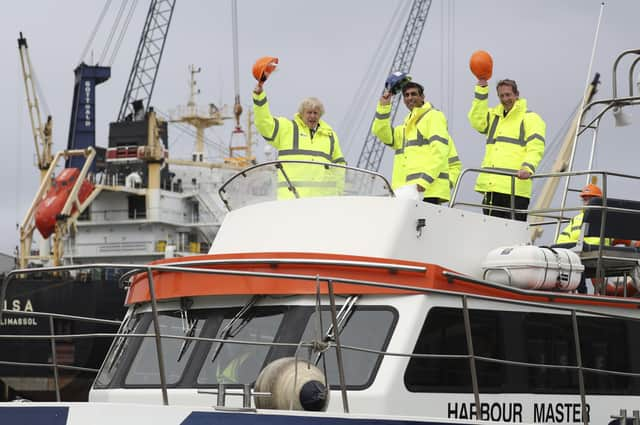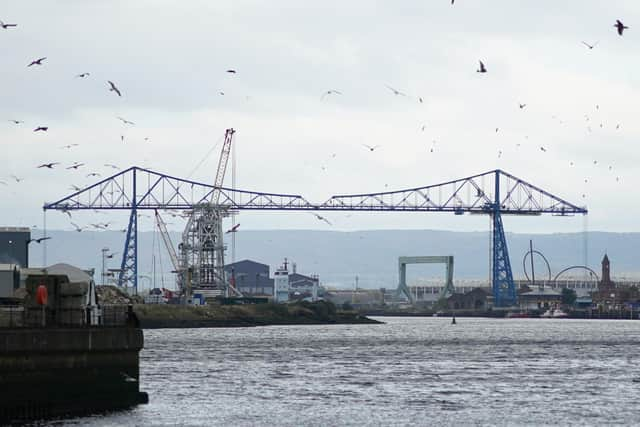Time to seize these freeport opportunities on the Tees and Humber to turbo-charge Brexit success – Phil Radford


Post-Brexit Britain is not emerging into a global trading environment that is naturally conducive to free trade. Government subsidies distort competition on a gigantic scale.
One way to cope with other countries’ subsidies and tax regimes without spending mega-bucks of taxpayers’ money is taking a radical approach to freeports. We should focus on industries where Britain can be a global leader.
Advertisement
Hide AdAdvertisement
Hide AdI’ve spent the last year analysing UK manufacturing and my work pinpoints three industries where Britain can restore export capability or become world-beaters: naval shipbuilding, offshore wind power and global pharmaceuticals.


First, shipbuilding. Britain hasn’t exported a new warship larger than a patrol vessel for more than 30 years. With the decline of Fergusons in Glasgow, Britain’s commercial shipbuilding is effectively dead.
To revive it, we need to attract pre-eminent marine engineering and expertise to Britain’s rusting slipways. Dedicated freeport shipyards could provide the incentive. There’s no room for economic jingoism here.
Top-grade corporate expertise in shipbuilding exists primarily in Japan and South Korea. Their companies have the know-how. It’s time to set off to the Far East and induce successful Japanese and Korean shipbuilders to take over moribund British shipyards.
Advertisement
Hide AdAdvertisement
Hide AdAnd the fact that Japanese or Korean companies build hulls for a fraction of the current cost in UK should incentivise the Ministry of Defence as well.
History shows what can be done. Honda, Toyota and Nissan built highly skilled workforces in UK car plants from the late 1980s onwards that became benchmarks for productivity by the late 1990s. Today, Daewoo, HHI, MHI and Japan Marine Limited could do the same.
In global pharmaceuticals, investment has swung away from the UK since 2010. The UK is a world leader in this sphere, but our manufacturing industry sadly lags behind Switzerland, Italy, Germany and France. Ireland exports almost twice the value of medicinal and pharmaceutical goods as the UK. What’s the one factor that analysts cite in Ireland’s pharma success? Tax.
Radicalism is needed. The Northern Ireland Protocol requires the region to follow EU laws for manufacturing new drugs. But the UK government sets the taxes that are levied on companies doing business in the province. So why not create a radical freeport in Northern Ireland specifically designed to enable pharma companies to compete on tax?
Advertisement
Hide AdAdvertisement
Hide AdThe proposition would hold long-term attractions to global pharma companies because the goods could be sold seamlessly into both markets under all foreseeable circumstances.
Then there is offshore wind – which is already powering up new industry on the Humber. The UK will probably install more offshore wind-generating capacity than any other country in the world over the next 10 years. Despite the energy and investment at the Humber’s Able Marine Energy Park, the UK will remain dependent on imports for most of the turbines planted out on the Hornsea Reef, and the other giant windfarms in the North Sea.
But the sheer scale of installations up to 2030 creates an almighty opportunity. With increased incentives, British firms could embed themselves into the global supply chains of the big turbine manufacturers and the wind farms themselves.
This includes creating the technologies that keep turbines going in stormy waters and storing that energy onshore. To do that, UK’s freeports – including on the Tees and the Humber – should evolve to this new global opportunity. We should try to recreate the amazing energy of London’s fintech scene, but with engineers and scientists in Hull.
Advertisement
Hide AdAdvertisement
Hide AdFree trade Brexit enthusiasts need to face up to a global economy defined by market distortions and a government constrained by fiscal and regulatory pressures. Radical freeports offer a way out. The UK should copy some radical freeport ideas from Asia, and create freeport havens where businesses can drastically reduce their tax burden. The elusive Brexit dividend could end up being more global and outward looking than many critics ever predicted.
Phil Radford is a trade analyst. His is the author of ‘Prospects for a Global Britain: Three Strategic Export Industries and How Freeports Can Help’ published by the Civitas think tank.
Support The Yorkshire Post and become a subscriber today. Your subscription will help us to continue to bring quality news to the people of Yorkshire. In return, you’ll see fewer ads on site, get free access to our app, receive exclusive members-only offers and access to all premium content and columns. Click here to subscribe.
Comment Guidelines
National World encourages reader discussion on our stories. User feedback, insights and back-and-forth exchanges add a rich layer of context to reporting. Please review our Community Guidelines before commenting.